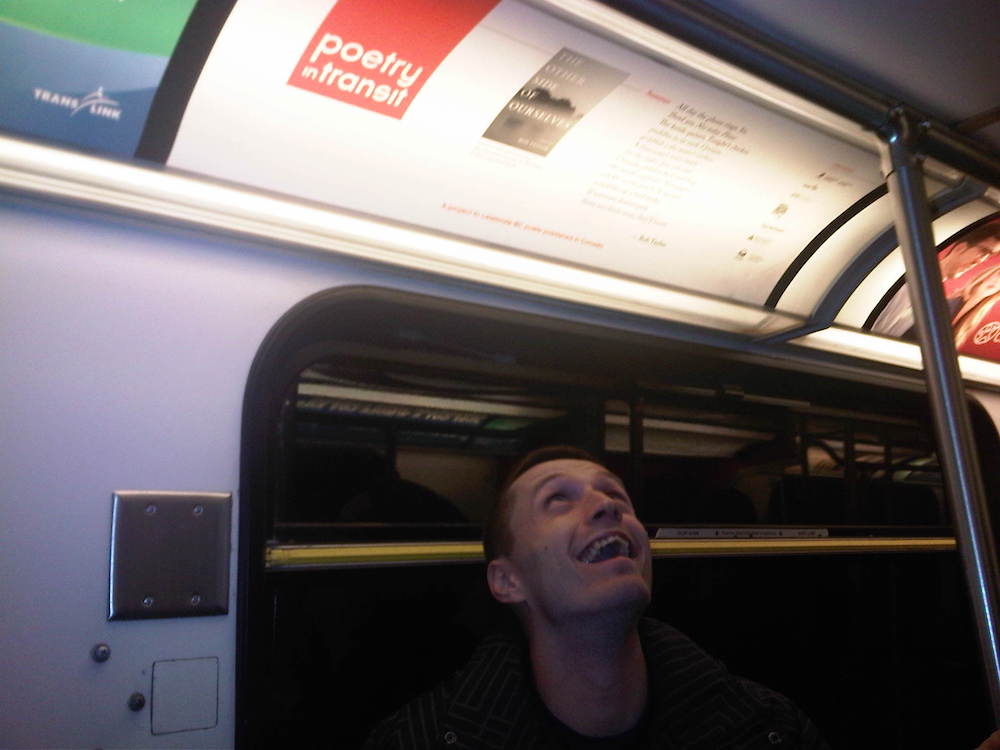I love the poem “Overnights at the Hospital” by Vancouver poet Ellie Sawatzky, for what it says and how it says it, and also now for where it says it. As part of the 26th edition of the Poetry in Transit program, Sawatzky’s poem can be found on buses and the SkyTrain in the Lower Mainland, and soon on buses around the province.
I envision riders boarding the bus late at night at Royal Columbian or St. Paul’s or Royal Jubilee and looking up to find the poem waiting for them between transit maps and community college ads:
Overnights at the Hospital
I have slept in the snow.
In a greenhouse. On other people’s
couches. In a hammock.
I’ve slept in the seats of cars, trucks, buses,
on the Trans-Canada highway, on goat paths,
gravel roads. I’ve slept in the sun. In
a bathtub. On someone’s
balcony, overlooking the lake.
In an orchard, a screen porch, an army barracks, and once
on a fold-out bed in a trailer, a spotted horse
in the yard outside, and buttercup dust on
my knees. Not
in the chair beside my father’s bed.
This is what it is to be awake.
I imagine an awareness rising in these weary passengers, engendered by a mere 95 words spread over 14 lines: the awareness that they do not carry their story alone.

I was 13 when B.C.’s Poetry in Transit program was inaugurated in 1996, and I hope the program’s founders envisioned a young reader-rider like me: lost (my father had died the preceding year) and seeking a way to be found through language.
That first year featured poems by celebrated B.C. poets Patrick Lane, Phyllis Webb, Kate Braid, Tim Bowling and others. Theirs were the first contemporary poems I’d ever read. I was struck by Lane’s poem, where he wrote of the “imagined mountain” one climbs, and “the peace he feels before descent.” And Bowling’s, “Steelhead, Spawning,” which closed in a way that seemed to speak both to Lane’s poem and directly to my father’s death: “we rise to the unbreathable element / of loss again.”
Like one of Bowling’s steelheads, I was hooked. And I wasn’t alone: market research suggests that Poetry in Transit has been particularly meaningful for teenagers. I roved buses and SkyTrain cars in search of poems. When I found one, I’d sit across from it the whole ride, reading. Those poems taught me that there was space for beauty in the world — at least a little rectangular one — and that I, as a reader, was invited to enter it. I couldn’t imagine that 26 years later I’d find myself on the Poetry in Transit selection jury, picking “Overnights at the Hospital” and nine other poems to venture out and do for others what the poems by Lane and Bowling had done for me.
In the 26 years I’ve had to mull it over, I’ve come to feel that the power of a Poetry in Transit poem lies in its mix of venue and length — a brief, captive audience for a briefly captured poem. Its fleetingness contains its strength; a Poetry in Transit poem is endless potential. Something remarkable might happen here between writer and reader.
If it doesn’t, well, at least you thoughtfully passed some time in your commute. If it does, though, your commute has been transformed, your day’s destination altered. And that opportunity presents itself over and over, for rider after rider, poem after poem.
Though their brevity opens up lofty possibilities, the length of Poetry in Transit poems was selected for more practical reasons: the poems had to fit on bus placards. Fourteen lines, no more. Should be easy, right? In literature, there are few things harder. “Short poems: be brief and tell us everything,” wrote American short-poem master Charles Simic.
Adding to the challenge, poets write towards books, not bus placards. Despite their flighty reputations, most poets possess a pragmatic streak: throughout history, what gets written is often tied to the size of the available page. Many of the literary devices we associate with poetry — rhyme, alliteration, repetition, etc. — were forged in preliterate societies as aides to memorization. As writing, reading and access to paper spread, poetry — once the primary medium for memorizing a people’s history or the map of the stars — was able to shrink down to the size of a single sheet.
In 13th century Italy, this resulted in the rise of the sonnet, a fourteen-line form that, according to the editors of In Fine Form: A Contemporary Look at Canadian Form Poetry, “was both persuasive and emotionally charged, that could easily be slipped into a waiting hand.” Around the same time in Japan, renga, a form of linked verse composed on four precisely subdivided sheets of paper, began its rise to prominence. The opening contribution to a renga session, which we now know as a haiku, was written on kaishi, or “pocket paper.” (And the prize for winning a renga session? You guessed it: paper!)
As printing technologies spread and democratized over the coming centuries, poems lengthened and shrank with the dimensions of the common printed page. It’s striking to notice, flipping through the average contemporary poetry book, how many “page-length” poems there are, and how comparatively few poems the length of sonnets or haiku remain. (If we see the same blank space long enough, it feels natural to fill it.)
This presents poets submitting poems to Poetry in Transit with a problem: if you don’t write short poems, how can you successfully trim your longer poems down to fit the shape of a placard? As a juror who’s seen many such attempts, I’ve concluded that you usually can’t. Every component in a poem is vital to the whole; remove one bit and the whole thing disassembles. Here’s former U.S. poet laureate Kay Ryan on this theme: “A poem really has no beginning and end, although it does appear to. All the parts of a poem exist as a sort of plasma, simultaneously apprehended, existing in the mind all at once.” Lengthy and humbling is the list of excellent poems, written by excellent poets, which have been rejected from Poetry in Transit because their plasma drained out during the surgery.
The poems that find a natural home in Poetry in Transit are those intentionally written for a smaller page. Some channel an older time of “pocket paper,” (as in Matsuki Masutani’s minimalist "At a party"), but increasingly, these poems are shaped by the dimensions of a new, digital page: the little white Instagram square which launched Canadian poet Rupi Kaur to the top of the New York Times bestseller list (and, following behind her, a legion of forgettable copycats). The dividends of that new “page” are beginning to show in Poetry in Transit poems as well: one of this year’s poems, Bára Hladík’s “a new economics of care” harnesses all the good of Instagram poetry (direct, sparse, emotionally open) while avoiding the bad (clichéd, overwrought, accompanied by photos of autumn leaves or cigarettes).

Excerpts do make their way into Poetry in Transit, but they often find a sneaky way to pull it off — poems constructed with detachable parts. Which brings us back to Ellie Sawatzky’s “Overnights at the Hospital.” It’s that rare exception: an excerpted poem that thrives despite its truncation (what you’ll read on the buses is 14 lines from a 29-line poem, which was originally published in Sawatzky’s debut collection None of This Belongs to Me).
Sawatzky’s poem is a list poem, a form which proves highly adaptable to new environments (another recent example of the form in Poetry in Transit is Dallas Hunt’s “Cree Dictionary”). This is because the form takes Kay Ryan’s notion of a poem having “no beginning and end” to heart; its lines are largely interchangeable.

List poems are, fundamentally, acts of attendance to the world: here is a thing that matters, and here is another and another and another. The order of its items matters less than the cumulative act. As Sawatzky’s speaker sits beside her father in hospital, we sit beside her, listening, recalling, merging her memories with our own (all the places we’ve slept, or have found ourselves unable), creating a story that is no longer fully Sawatzky’s and not yet entirely ours. In reading a list poem, we collaborate with the writer to conjure a story where it seems none existed.
It goes without saying that there isn’t much room for narrative in 14 lines. A list poem gets around this by giving us the raw material for a narrative — key items, or observations, or plot points — with all the watery connective tissue sucked out. The poem then waits for us to rehydrate it (“replasma” it, perhaps…) with our attention.
A lesser version of “Overnights at the Hospital” might read: “At my father’s bedside I realized the comfort I’ve felt all my life, which allowed me to sleep easily in far-flung places, was only possible because of his steady vigil over my life. Now, the roles reversed, I see that that security may be lost to me forever.” (Insert the line breaks where you will.)
That “poem” may be emotionally accurate to the poet, but it means less to the reader, as we haven’t been given the space to arrive at our own unique feelings. (The feelings above are mine, shaped by my experience of my own father’s illness and death. I don’t know if they reflect Sawatzky’s; it doesn’t really matter if they do.) This resiliency — the requirement that list poems leave fruitful gaps between their narrative details — is what allows them to be chopped in half and not only survive, but thrive.
This isn’t to say there’s no loss in halving a list poem. In Sawatzky’s case that loss is of the lulling a longer list invokes. In the full version of “Overnights at the Hospital,” we enter more deeply into the rhythmic listing of sleeping spots, so that when we reach the concluding line it shocks us into even sharper alertness. But the fundamental nature of the poem, the way it offers its disparate details for us to connect, remains unchanged.
The challenge of the small poem is one of the greatest in poetry. That poets in British Columbia pull it off with enough frequency to fill our buses every year — by channelling forms old, new and resilient — is cause for celebration.
Perhaps for you, like me, that celebration comes in looking up and quietly reading a poem on the bus, then finding yourself subtly changed. To make space for poetry, even a mere 14 lines of it, enriches your life in and of itself, and also serves as practice towards larger acts: opening yourself to reflection, collaboration and companionship in all their forms.
This is what I needed so desperately when I was 13, pacing up and down buses in search of poems, and what I need just as badly today. Little openings that, if tended to, expand; little stories that, if watered, grow.
I hope in your life you’re able to find such openings, especially if at the end of a long and difficult day. May those moments, however they arrive, shock you from slumber and leave you truly awake. ![]()
Read more: Transportation, Media
















Tyee Commenting Guidelines
Comments that violate guidelines risk being deleted, and violations may result in a temporary or permanent user ban. Maintain the spirit of good conversation to stay in the discussion.
*Please note The Tyee is not a forum for spreading misinformation about COVID-19, denying its existence or minimizing its risk to public health.
Do:
Do not: